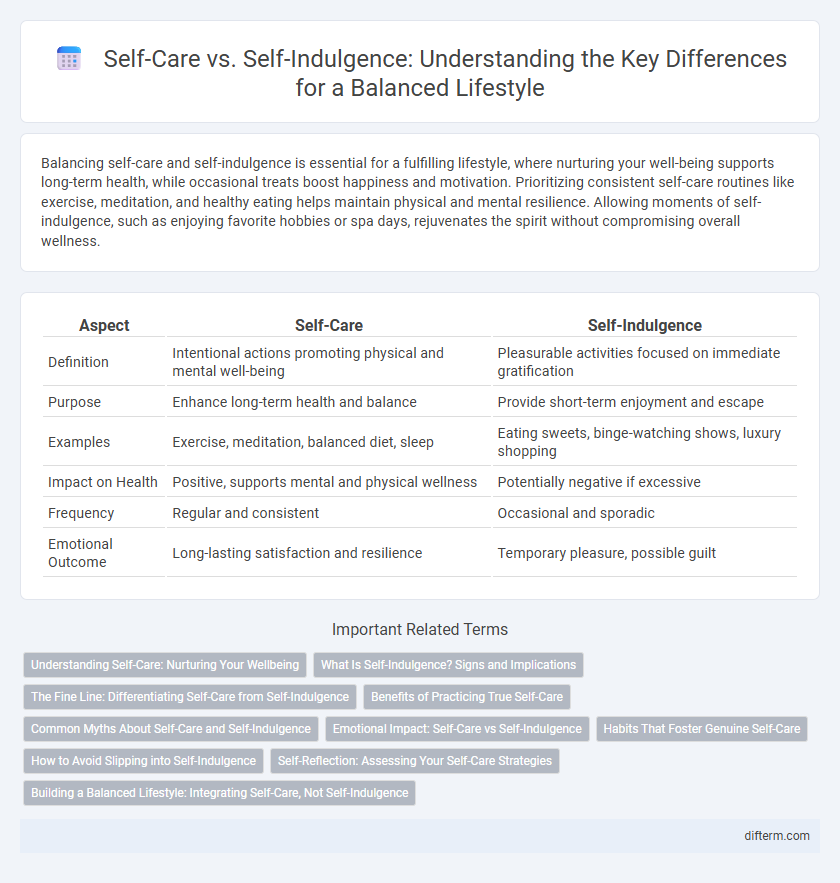Balancing self-care and self-indulgence is essential for a fulfilling lifestyle, where nurturing your well-being supports long-term health, while occasional treats boost happiness and motivation. Prioritizing consistent self-care routines like exercise, meditation, and healthy eating helps maintain physical and mental resilience. Allowing moments of self-indulgence, such as enjoying favorite hobbies or spa days, rejuvenates the spirit without compromising overall wellness.
Table of Comparison
| Aspect | Self-Care | Self-Indulgence |
|---|---|---|
| Definition | Intentional actions promoting physical and mental well-being | Pleasurable activities focused on immediate gratification |
| Purpose | Enhance long-term health and balance | Provide short-term enjoyment and escape |
| Examples | Exercise, meditation, balanced diet, sleep | Eating sweets, binge-watching shows, luxury shopping |
| Impact on Health | Positive, supports mental and physical wellness | Potentially negative if excessive |
| Frequency | Regular and consistent | Occasional and sporadic |
| Emotional Outcome | Long-lasting satisfaction and resilience | Temporary pleasure, possible guilt |
Understanding Self-Care: Nurturing Your Wellbeing
Self-care involves intentional actions that support mental, physical, and emotional wellbeing, promoting long-term health and balance. It includes practices like mindfulness, proper nutrition, and regular exercise that nurture resilience and reduce stress. Understanding the distinction from self-indulgence empowers individuals to prioritize sustainable habits over fleeting comfort.
What Is Self-Indulgence? Signs and Implications
Self-indulgence refers to excessive gratification of one's desires and pleasures without regard for long-term consequences or personal well-being. Common signs include habitual overconsumption, procrastination, and prioritizing momentary satisfaction over responsibilities. This behavior can lead to negative implications such as reduced productivity, emotional imbalances, and strained relationships.
The Fine Line: Differentiating Self-Care from Self-Indulgence
Recognizing the fine line between self-care and self-indulgence is essential for maintaining mental and physical well-being, as self-care involves intentional actions that promote long-term health and balance, while self-indulgence often focuses on short-term pleasure without considering consequences. Effective self-care practices include activities like mindfulness, exercise, and healthy eating that nurture the body and mind sustainably. In contrast, self-indulgence typically manifests through excessive behaviors such as overeating, overspending, or avoiding responsibilities, which can undermine personal growth and wellness goals.
Benefits of Practicing True Self-Care
True self-care involves intentional actions that promote physical, mental, and emotional well-being, leading to increased resilience and reduced stress. Prioritizing self-care enhances productivity, improves sleep quality, and fosters a balanced lifestyle. Unlike self-indulgence, which often offers temporary pleasure, genuine self-care provides lasting health benefits and supports sustainable personal growth.
Common Myths About Self-Care and Self-Indulgence
Common myths about self-care and self-indulgence often blur the lines between necessary wellness practices and excessive pampering. Self-care involves intentional actions to maintain mental, emotional, and physical health, while self-indulgence typically refers to short-term pleasure without long-term benefit. Misconceptions that self-care is selfish or that all indulgences are harmful hinder adopting balanced lifestyle habits essential for overall well-being.
Emotional Impact: Self-Care vs Self-Indulgence
Self-care nurtures emotional well-being by promoting resilience and long-term mental health through mindful practices such as meditation and balanced routines. Self-indulgence often triggers short-term pleasure but may lead to emotional imbalance or guilt when overused as a coping mechanism. Prioritizing self-care fosters sustainable emotional stability, while frequent self-indulgence risks undermining psychological growth and self-esteem.
Habits That Foster Genuine Self-Care
Habits that foster genuine self-care include consistent sleep routines, mindful eating, and regular physical activity, all of which contribute to long-term well-being rather than fleeting pleasure. Practicing mindfulness meditation and setting healthy boundaries support emotional resilience and reduce stress, distinguishing self-care from mere self-indulgence. Prioritizing balanced hydration and scheduled breaks enhances mental clarity and stamina, reinforcing sustainable lifestyle improvements.
How to Avoid Slipping into Self-Indulgence
Maintaining a balanced self-care routine involves setting clear boundaries to differentiate genuine wellness practices from self-indulgent behaviors that offer temporary pleasure but hinder long-term goals. Prioritize activities that promote mental and physical health, such as regular exercise, mindful eating, and sufficient rest, while avoiding excessive consumption or escapism. Mindful reflection and goal-oriented planning help prevent slipping into self-indulgence, ensuring self-care remains purposeful and sustainable.
Self-Reflection: Assessing Your Self-Care Strategies
Effective self-reflection involves evaluating your self-care strategies to ensure they promote long-term well-being rather than momentary pleasure. Distinguishing self-care practices like regular exercise, balanced nutrition, and mindfulness from self-indulgence behaviors helps maintain mental and physical health. Tracking progress and adjusting routines based on emotional and physical responses enhances the effectiveness of self-care plans.
Building a Balanced Lifestyle: Integrating Self-Care, Not Self-Indulgence
Prioritizing self-care involves nurturing mental, emotional, and physical health through consistent habits like exercise, mindful practices, and proper rest, rather than fleeting self-indulgence which often centers on immediate gratification. Building a balanced lifestyle requires setting boundaries and creating routines that support long-term well-being and resilience. Integrating self-care as a foundational element promotes sustainable happiness, energy, and productivity.
Self-care vs Self-indulgence Infographic

 difterm.com
difterm.com